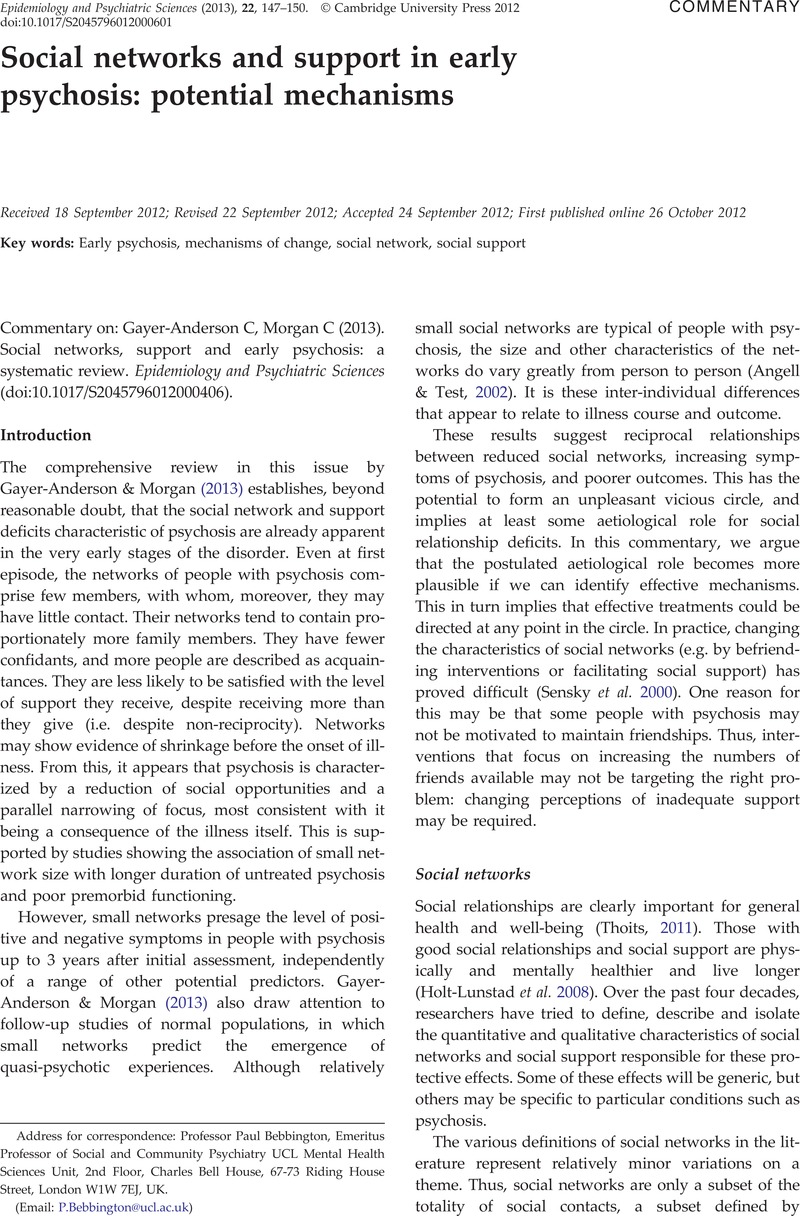Crossref Citations
This article has been cited by the following publications. This list is generated based on data provided by Crossref.
Bellani, M.
Nobile, M.
Bianchi, V.
van Os, J.
and
Brambilla, P.
2013.
Genotype by environment interaction and neurodevelopment III. Focus on the child's broader social ecology.
Epidemiology and Psychiatric Sciences,
Vol. 22,
Issue. 2,
p.
125.
Jolley, S.
Ferner, H.
Bebbington, P.
Garety, P.
Dunn, G.
Freeman, D.
Fowler, D.
and
Kuipers, E.
2014.
Delusional belief flexibility and informal caregiving relationships in psychosis: a potential cognitive route for the protective effect of social support.
Epidemiology and Psychiatric Sciences,
Vol. 23,
Issue. 4,
p.
389.
Kuo, Yen-Ku
Kuo, Tsung-Hsien
and
Ho, Li-An
2014.
Enabling innovative ability: knowledge sharing as a mediator.
Industrial Management & Data Systems,
Vol. 114,
Issue. 5,
p.
696.
Badcock, Johanna C.
Shah, Sonal
Mackinnon, Andrew
Stain, Helen J.
Galletly, Cherrie
Jablensky, Assen
and
Morgan, Vera A.
2015.
Loneliness in psychotic disorders and its association with cognitive function and symptom profile.
Schizophrenia Research,
Vol. 169,
Issue. 1-3,
p.
268.
Rüsch, Nicolas
Heekeren, Karsten
Theodoridou, Anastasia
Müller, Mario
Corrigan, Patrick W.
Mayer, Benjamin
Metzler, Sibylle
Dvorsky, Diane
Walitza, Susanne
and
Rössler, Wulf
2015.
Stigma as a stressor and transition to schizophrenia after one year among young people at risk of psychosis.
Schizophrenia Research,
Vol. 166,
Issue. 1-3,
p.
43.
Kennedy, Stephanie C.
and
Tripodi, Stephen J.
2015.
Childhood Abuse and Postpartum Psychosis.
Affilia,
Vol. 30,
Issue. 1,
p.
96.
Young, Gerald
2016.
Unifying Causality and Psychology.
p.
535.
Onwumere, Juliana
Grice, Sarah
and
Kuipers, Elizabeth
2016.
Delivering Cognitive‐Behavioural Family Interventions for Schizophrenia.
Australian Psychologist,
Vol. 51,
Issue. 1,
p.
52.
Onwumere, J.
Learmonth, S.
and
Kuipers, E.
2016.
Caring for a relative with delusional beliefs: a qualitative exploration.
Journal of Psychiatric and Mental Health Nursing,
Vol. 23,
Issue. 3-4,
p.
145.
Claxton, Melanie
Onwumere, Juliana
and
Fornells-Ambrojo, Miriam
2017.
Do Family Interventions Improve Outcomes in Early Psychosis? A Systematic Review and Meta-Analysis.
Frontiers in Psychology,
Vol. 8,
Issue. ,
Michalska da Rocha, Beata
Rhodes, Stephen
Vasilopoulou, Eleni
and
Hutton, Paul
2018.
Loneliness in Psychosis: A Meta-analytical Review.
Schizophrenia Bulletin,
Vol. 44,
Issue. 1,
p.
114.
Degnan, Amy
Berry, Katherine
Sweet, Daryl
Abel, Kathryn
Crossley, Nick
and
Edge, Dawn
2018.
Social networks and symptomatic and functional outcomes in schizophrenia: a systematic review and meta-analysis.
Social Psychiatry and Psychiatric Epidemiology,
Vol. 53,
Issue. 9,
p.
873.
Li, Xiying
Tan, Zuyu
Guo, Ning
Qi, Senqing
and
Shao, Jingjin
2019.
The impact of effort-reward imbalance on loneliness of the elderly: the multiple mediation effect of social support and control belief in social domain.
Journal of Elder Abuse & Neglect,
Vol. 31,
Issue. 4-5,
p.
294.
Georgaca, Eugenie
and
Zissi, Anastasia
2019.
Socially differentiated life trajectories of individuals with experience of psychosis: A biographical study.
Mental Health & Prevention,
Vol. 14,
Issue. ,
p.
100153.
Gardner, Andrew
Cotton, Sue
O’Donoghue, Brian
Killackey, Eóin
Norton, Peter
and
Filia, Kate
2019.
Group differences in social inclusion between young adults aged 18 to 25 with serious mental illness and same-aged peers from the general community.
International Journal of Social Psychiatry,
Vol. 65,
Issue. 7-8,
p.
631.
Buck, Benjamin
Scherer, Emily
Brian, Rachel
Wang, Rui
Wang, Weichen
Campbell, Andrew
Choudhury, Tanzeem
Hauser, Marta
Kane, John M.
and
Ben-Zeev, Dror
2019.
Relationships between smartphone social behavior and relapse in schizophrenia: A preliminary report.
Schizophrenia Research,
Vol. 208,
Issue. ,
p.
167.
McGuire, Nicola
Melville, Craig
Karadzhov, Dimitar
and
Gumley, Andrew
2020.
“She is more about my illness than me”: a qualitative study exploring social support in individuals with experiences of psychosis.
Psychosis,
Vol. 12,
Issue. 2,
p.
128.
Alvarez-Jimenez, Mario
Rice, Simon
D'Alfonso, Simon
Leicester, Steven
Bendall, Sarah
Pryor, Ingrid
Russon, Penni
McEnery, Carla
Santesteban-Echarri, Olga
Da Costa, Gustavo
Gilbertson, Tamsyn
Valentine, Lee
Solves, Laia
Ratheesh, Aswin
McGorry, Patrick D
and
Gleeson, John
2020.
A Novel Multimodal Digital Service (Moderated Online Social Therapy+) for Help-Seeking Young People Experiencing Mental Ill-Health: Pilot Evaluation Within a National Youth E-Mental Health Service.
Journal of Medical Internet Research,
Vol. 22,
Issue. 8,
p.
e17155.
Misra, Supriya
Johnson, Kelsey A.
Parnarouskis, Lindsey M.
Koenen, Karestan C.
Williams, David R.
Gelaye, Bizu
and
Borba, Christina P. C.
2020.
How Early Life Adversities Influence Later Life Family Interactions for Individuals with Schizophrenia in Outpatient Treatment: A Qualitative Analysis.
Community Mental Health Journal,
Vol. 56,
Issue. 6,
p.
1188.
Zou, Denise S.
Cowan, Henry R.
Azis, Matilda
and
Mittal, Vijay A.
2021.
Reciprocal Social Behavior and Related Social Outcomes in Individuals at Clinical High Risk for Psychosis.
Psychiatry Research,
Vol. 306,
Issue. ,
p.
114224.


